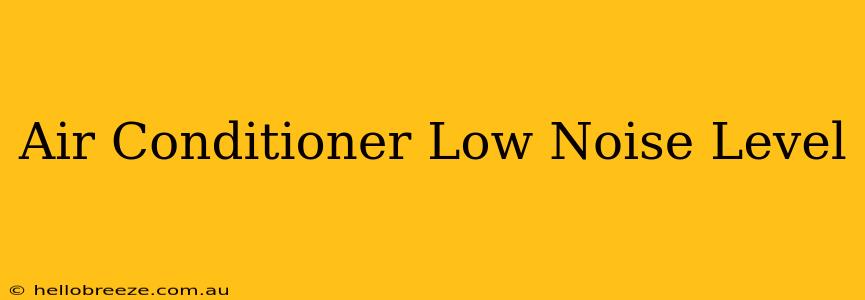Finding the right air conditioner can be tricky. While cooling power is crucial, many homeowners prioritize a low noise level. A noisy AC unit can disrupt sleep, conversations, and overall peace of mind. This guide explores how to find an air conditioner that delivers effective cooling without the unwanted racket.
Understanding Air Conditioner Noise Levels
Air conditioner noise is measured in decibels (dB). Generally, lower decibel ratings indicate quieter operation. A whisper is around 30 dB, normal conversation is about 60 dB, and a vacuum cleaner can reach 70-80 dB. Many air conditioners operate between 45-65 dB, but significant differences exist between models and brands.
Factors Affecting Air Conditioner Noise
Several factors contribute to the noise produced by an air conditioner:
- Compressor: This is often the loudest component. Inverter technology compressors are generally quieter than traditional ones.
- Fan: The fan's speed and design influence noise levels. Larger, slower-moving fans tend to be quieter.
- Airflow: Restricted airflow can increase noise. Proper installation and regular maintenance are vital.
- Refrigerant: The type of refrigerant used can affect the noise produced by the system.
- Location: Installing the unit on a solid foundation and away from windows and walls can minimize noise transmission.
Finding a Quiet Air Conditioner: Key Features to Look For
When searching for a low-noise air conditioner, pay close attention to these features:
- Decibel Rating: Check the manufacturer's specifications for the decibel rating. Look for models with ratings below 50 dB.
- Inverter Technology: Air conditioners with inverter technology offer quieter operation and improved energy efficiency. They adjust the compressor speed based on cooling demand, reducing noise during periods of less cooling needed.
- Fan Speed Control: Models with multiple fan speed settings allow you to prioritize quiet operation when cooling demands are lower.
- Sound-Dampening Features: Some manufacturers incorporate sound-dampening materials or designs to reduce noise levels.
- Reviews: Check online reviews to see what other users say about the noise level of specific models. Look for comments specifically mentioning noise levels.
Beyond the Specs: Choosing the Right AC Unit for Your Needs
Selecting an air conditioner involves more than just noise level. Consider:
- Room Size: Choose a unit with the appropriate BTU rating to efficiently cool your space. An underpowered unit will work harder and potentially be louder.
- Energy Efficiency: Look for an Energy Star-certified model to save money on your energy bills. These models often have better sound insulation as well.
- Installation: Professional installation is crucial for optimal performance and noise reduction. Improper installation can lead to higher noise levels and reduced efficiency.
Maintaining a Quiet Air Conditioner
Regular maintenance is key to ensuring your air conditioner continues running quietly.
- Clean the Filters: Dirty filters restrict airflow, leading to increased noise. Clean or replace filters regularly, according to the manufacturer's recommendations.
- Professional Maintenance: Schedule annual professional maintenance to check for any issues that could be contributing to increased noise.
By considering these factors, you can find the perfect low-noise air conditioner to ensure a cool, quiet, and comfortable home environment. A little research goes a long way in achieving peaceful cooling!

